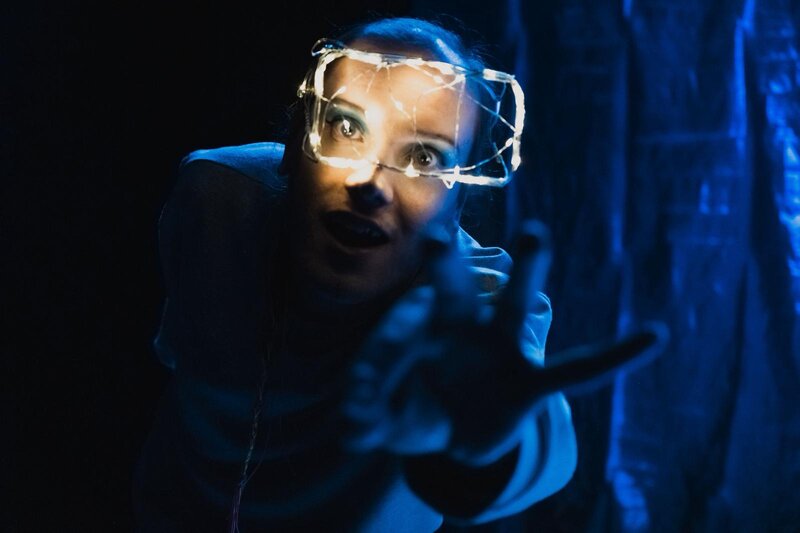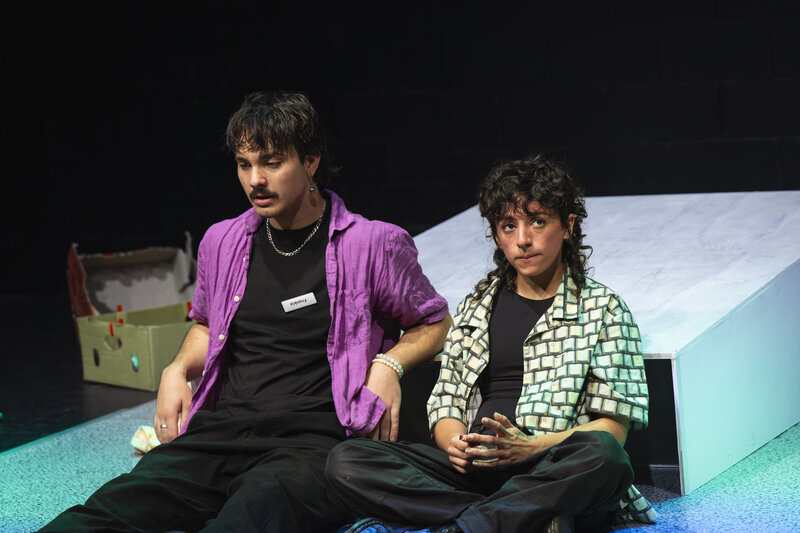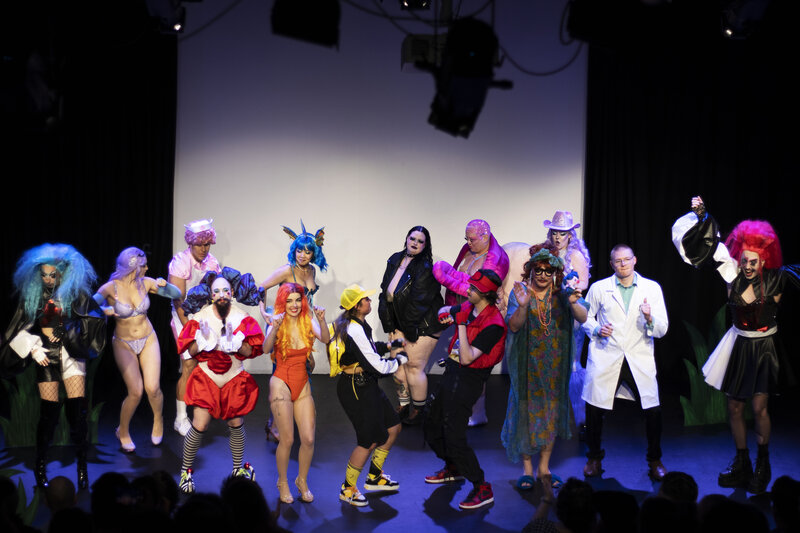So, when Ladies Day, by Alana Valentine, concluded the other evening, at the Griffin, my guest and I discussed: “What was the play about?”
Says the Director, Darren Yap:
Ladies Day is an important, honest and confronting play. It’s not only an intelligent piece about people living on the margins who don’t often get a chance to tell their stories, but it also hits you in the gut. For me the stories of men not being able to ‘come out’ as gay because of their upbringing or culture – or older men who will die never ‘coming out’ to their friends as ‘homosexual’ (it will be their secret) saddens me because it has been my journey too. Also it is a great night in the theatre!
Alana has taken her interviews and crafted them into an intricate, entertaining story. And as some of these characters are based on real interviews it makes us responsible to honour these characters which is a great motivation. … Any new work is an honour and a challenge. You want to find the perfect communion between the story and the audience. The perfect balance between the intellect and the soul where we ultimately will feel something deeply . …
 What is especially pleasing about this work is the emotional rawness and complications of the characters’ explanations of their pain and its sources – the personal and the cultural inhibitions. The issues of physical and psychological discrimination and abuse, bullying (male rape, for instance) not only from the world at large, but from within the ‘gay community’ itself, is an enlightening and profoundly important exposure and conversation. That the writing by Ms Valentine of her four characters is so ‘full-on’ and staggeringly visceral can make, for some, a very rewarding night in the theatre. Its politic is very, very, welcome. That the Griffin has taken Ladies Day on, whether it be just a gesture to the Sydney Gay and Lesbian Mardi Gras season or not, is a sign of a toughening of responsibility as to the content of the work that goes beyond ‘entertainment’ on this important stage. Last year’s production of The Bleeding Tree and its vivid societal concerns are continued with the ‘weightiness’ of this work.
What is especially pleasing about this work is the emotional rawness and complications of the characters’ explanations of their pain and its sources – the personal and the cultural inhibitions. The issues of physical and psychological discrimination and abuse, bullying (male rape, for instance) not only from the world at large, but from within the ‘gay community’ itself, is an enlightening and profoundly important exposure and conversation. That the writing by Ms Valentine of her four characters is so ‘full-on’ and staggeringly visceral can make, for some, a very rewarding night in the theatre. Its politic is very, very, welcome. That the Griffin has taken Ladies Day on, whether it be just a gesture to the Sydney Gay and Lesbian Mardi Gras season or not, is a sign of a toughening of responsibility as to the content of the work that goes beyond ‘entertainment’ on this important stage. Last year’s production of The Bleeding Tree and its vivid societal concerns are continued with the ‘weightiness’ of this work.
Ms Valentine is a prize winning playwright with a body of work that reflects a social conscience and sense of responsibility to her ‘worlds’ that is, significantly, of a wide interest: Parramatta Girls (2007) – a play from the survivors of a notorious state-run girl’s care home; Run Rabbit Run (2004) – a play about the political actions of working class supporters of a football club under threat of expulsion from major competition, both seen at Belvoir, for instance. Head Full of Love (2012), a play concerned with Indigenous health that consequently helped raise some $60,000 donation for kidney dialysis machines in Alice Springs, give an indication of the seriousness of her commitment. The work Ms Valentine does is one of intense research, living with, interviewing and recording actual individuals. Its methodology has been given the nomenclature of ‘verbatim theatre’, and ensures at the very least, a powerful veracity.
Ms Valentine, in her program notes, tells us:
Ladies Day has benefitted from the generous self-disclosure of men who identify as homosexual living in Broome, elsewhere in the Kimberly and also in the Northern territory, especially Darwin and Katherine.
What she further writes seems to me a significant part of the agenda/thematic concern of this work/play and is very oddly and conspicuously ignored by the Director, Mr Yap, which, I think, provoked my companion’s and my question at the end of the performance: “What was the play about?” For, though the content of the men’s interactions is front-and-centre and is, as Mr Yap tells us – important, honest and confronting – the big issue of the play is surely the artistic dilemma of the writer involved with this kind of personally intense research, this verbatim research, and then the necessity for the writer in having to ‘massage’ it, organise it, with dramatic (poetic) licence to a theatrical form. ‘Bending’ the actual verbatim recordings for dramatic impact.
Back to Ms Valentine’s notes:
Given my own sustained relationship with the GLBTI communities of Sydney (and elsewhere) it would be fair to say that much of my life has contributed to the portraits of the characters in the drama. The line between truth and fiction is one which audiences themselves must draw. My sincere contract with the audience for Ladies Day is hope this work is no less true for being an artifice of conflations, amalgamations and combinations of stories from real life.
There are three principal male characters in this play: Mike (Wade Briggs), Liam (Matthew Backer) and Rodney (Elan Zavelsky), which are likely, as Ms Valentine ‘confesses’, conflations of many men and their stories – each of these characters, an artifice, a fictional construct. Her other major character is that of Lorena (Lucia Mastrantone), a playwright researching and interviewing these men on ‘location’ – finding verbatim. We discover it is a tough, wild assignment, which is then thrown into disarray when Lorena is confronted with the admittance by two of the men that some of their testament to her has been fictional. At first outraged she, later, reflects upon her own manipulation of the ‘verbatim’ truths, she employs, to conflate, amalgamate and combine, to make a palatable drama for an audience in her method of creation. Have these men fantasised some of their ‘verbatim’ to be able to ‘massage’ it into a bearable experience – a theatrical licence take? Just as she does in her methodology? One is drawn to ask, if the men are ‘fictional constructs’, conflations, of many research subjects made by Ms Valentine, how much is Lorena a ‘fictional construct’, a conflation of other writers? Or is Lorena simply a mask for Ms Valentine’s own wrestle with her work methods? Tantalising, yes? Is Lorena, the person she has ‘met’, at last, that allows her to speak some of her own verbatim story?
 Lorena in the second scene of the play, concludes a long speech about the hardest things she has ever done. She prioritises to two – the first is masturbation on request from a stranger, the second is including herself in her own play (a writer’s indulgence – ‘masturbation’!). The tantalising dramatic tease of this introduced idea is: is Lorena a persona representing the actual author Alana Valentine? Is it the core play within a play, within the play?
Lorena in the second scene of the play, concludes a long speech about the hardest things she has ever done. She prioritises to two – the first is masturbation on request from a stranger, the second is including herself in her own play (a writer’s indulgence – ‘masturbation’!). The tantalising dramatic tease of this introduced idea is: is Lorena a persona representing the actual author Alana Valentine? Is it the core play within a play, within the play?
Says Lorena, the playwright in Ladies Day:
So the second hardest thing I have ever done is this, include myself in my own play. Because I am better at telling other’s people’s stories. At least I’m more comfortable. I know that for every artist it’s always about yourself even when it is someone else, but just for the moment, ignoring the universal theme line and facing the fact that I am placing myself in my own play, this story of a writer going to Broome and what happens to her is the second hardest thing I have ever done. Because it is just like the (first) hardest thing I have ever done, just so personal.
Where we really live, what whispers to us, what haunts us, what helps us, what drives us. People can’t always talk about that straight out. Can’t always put it into words.
And then, just sometimes, you meet someone who can. But not the way you expect.
Is Lorena Ms Valentine’s unexpected someone who can help her speak about the ‘conscience’, well spring of her work, her work form? Her own digital rape in a public swimming pool? Is it a truth? And whose is it? Which writer are we hearing? Lorena or Alana? Daring stuff, both subjectively and objectively to put into the public space in the theatre. Kind of thrilling, I reckon – the challenge to consider the nakedness of the workings of the creative artist and their ‘moral’ responsibilities – in this case, the writer’s.
This huge dilemma of Lorena’s (Alana?) is the centre of this play, I reckon, but not this production, sadly. It seems to me from the program notes of Mr Yap’s, quoted at the start of this review, that he has been distracted from the main ‘game’ of the play because of his own identification with the material: that it has hit him in ‘the gut’ and ‘saddens’ him because the intense plight of these men on the page has been ‘my journey too.’ – it has too much personal ‘soul’. Subjective response rising above the objective dramaturgical observation of the writing. We are invited to watch only a partly realised play – a very personalised one of Mr Yap’s – and not the real core of Ms Valentine’s concern/truth questing, in Ladies Day.
Yet, what Mr Yap has achieved in drawing such fine performances from his actor’s is more than worth seeing. Mr Zavelsky is especially impressive in the sensitive and skillful ‘handling’ of Rodney’s long speech about the transition from the young beauty to the older man, as is his wonderful contrast to the the ‘stunted’ villainy’ of John. Too, Ms Mastrantone, gives a fully committed ‘shape-shifting’ between Lorena and the female police officer, Therese – the focused contrast electric in its control. If Ms Mastrantone had been able to explore the ‘writer’s dilemma’ more overtly, and Lorena be something more than a dramaturgical function for the exposition of the men’s story, one wonders what could have been unleashed, for on the evidence of her performance, not much is beyond her means – it certainly would have placed Lorena’s speech of rape, delivered with spellbinding tension and growing horror by Ms Mastrantone, in a clearer and intriguing, purposeful dramatic light. Mr Backer is as good as usual, but seems, less vivid in his creation than some of his other recent work (The Tempest). His rendering of a love song of sexual longing at the end of scene 16: ‘I can’t breathe for thinking about your mouth …’ was – and it is, oddly, stylistically, the only song of its kind in the show – relatively muffled in articulation and expression of truth. While Mr Briggs, especially when the play begins, employs ‘noise’ to create Mike, and tends not to employ much nuance of word usage and vocal range to reveal the ‘grief’ and ‘rage’ of this handsome man/boy. Big energy textual generalisations tend to flatten out the performance and, really, is not sufficient to engage our empathy. The performance settled but was not altogether of a whole.
The musical scoring of some songs by Max Lambert (associate composer, Roger Lock) mostly, missed the mark, were indulgent and often seemed to be nothing more than ‘covers’ for the clumsy scene shifting of furniture and costume change, that the Design of James Browne encumbered the action of the play with. Neither the music nor the lyrics of the songs moved the play forward, and appeared to be more a gesture of cabaret-entertainment than necessary dramaturgy. There relentless inclusion seemed to attempt to justify Mr Yap’s notes where he says the play is, “Also a great night in the theatre! … an entertainment.” At 100 minutes in length, without interval, this production could have been edited – I reckon the songs could go. I mean, however entertaining the a cappella rendition of the opening song maybe, the lyrics appear, in retrospect, not very accurate to what follows:
The queers in Broome are quite ill-groomed,
the gays in Broome are fat,
They’ve left the scenery city life
To wear a wide-brimmed hat.
The queers in Broome are coupled up,
They renovate and work,
You might get propositioned by
the hotel front desk clerk.
The core concerns of Ladies Day are far more urgent than the content of that welcome song to country, Broome country, however charmingly, energetically sung.
Ladies Day, is a very interesting play. I found the production thwarting but still had a very arresting time in the theatre. It runs at the SBW Stables Theatre in Kings Cross, Sydney until 26 March 2016, and you can book tickets HERE.
Kevin Jackson
For more of Kevin Jackson’s theatre reviews, check out his blog at Kevin Jackson’s Theatre Diary

David Edwards is the former editor of The Blurb and a contributor on film and television




